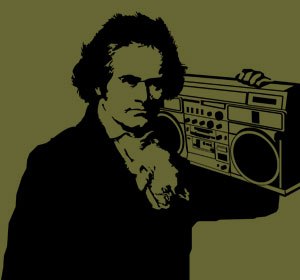by natchaitkin | May 19, 2014 | Uncategorized
In a post last week, I talked about Time for Three. They play tunes you don’t expect classical musicians to, like The Beatles’ “Blackbird” and Leonard Cohen’s “Hallelujah.” They also do mashups, where Grieg’s Holberg Suite morphs into Led Zeppelin and Justin Timberlake (and goes back too – a neat trick).
Now, playing other people’s music well is not easy – anyone who’s heard a third-rate band ruining their favorite song at a frat party knows that all too well. But these guys bring the same level of artistic integrity to their covers that they do to the Bach Double Concerto.
Check out tf3’s version of “Little Lion Man”, and compare it to the original by Mumford and Sons. I like tf3’s version even better, and that leads us to our new playlist – music that’s been “covered” and arguably improved.
Bach did this all the time, taking pieces by Vivaldi and other composers, and making them his own. Ravel (along with Emerson, Lake and Palmer) did much the same thing with Mussorgsky’s “Pictures at an Exhibition.” Jimi Hendrix did it too – Bob Dylan stopped performing his own song “All Along the Watchtower” once he heard Hendrix’s version – high praise indeed. Ray Charles was a master of this. Miles Davis, too – check out his “Someday, My Prince Will Come” on the playlist.
Sometimes these reworkings aren’t so successful – Mahler’s re-orchestrations of Beethoven’s symphonies don’t get played much. Shostakovich re-worked the Schumann Cello Concerto, to no one’s approval I’m aware of. Here’s a list from Rolling Stone of some pretty bad ones from the rock world – I vote for William Shatner’s rendition of “Lucy in the Sky with Diamonds.”
So, what’s your favorite cover, or your least? Classical, rock, r&b, country – whatever. Post your favorites to the comments and add the music to the playlist – both the original and “improved” versions if possible!
by natchaitkin | May 14, 2014 | Uncategorized
Is classical music entertainment?
Recently, the very traditional world of classical music has been revitalized by people trying new things (and not a moment too soon). One of my favorites: Time for Three, who call themselves the world’s first “classically trained garage band.”
They are, first and foremost, GREAT players, trained at one music’s elite academies, the Curtis Institute. But they also put on a great show, playing original compositions, tunes by Mumford and Sons, and mashups of Grieg’s Holberg Suite with Led Zeppelin and Justin Timberlake. Next week’s playlist will be about “cover” songs, and I’ll include some of their tunes.
I’ve gotten to back these guys up twice this season, including last weekend with the ProMusica Chamber Orchestra.

As we walked offstage, my stand partner, Joel, (who is an innovator too – check out his group Revel) said “Kind of points out the obvious, doesn’t it – we’re in the entertainment business.” A simple statement, to which many people would say “Duh” but many others (mostly ones in the business) would say “Oh, no – what we do is too important and meaningful to be called entertainment.”
This is one of classical music’s biggest challenges – those of us who perform it see it as a a transcendent, even spiritual experience worth making an effort for, and many potential audience members think of it as just one of many choices for their leisure time. Both views are right, I think, but classical music organizations have had a hard time getting more people to come to concerts because of this difference.
Time for Three has one approach that tries to bridge that gap, and they are making a good case for shaking things up. It’s not the only solution, but it’s a good one, I think. Please post your comments, and add groups or performers you think are changing the concert world for the better.
Till Monday (and the new playlist),
Nat
by natchaitkin | May 12, 2014 | Uncategorized
Why is Beethoven’s 5th Symphony the one piece of “classical” music everyone knows? Because it’s the same four note idea repeated several hundred times!

You know those songs you can’t forget? Usually, it’s the hook that gets stuck in your head, whether it’s Beethoven’s Op. 18 #1 or My Sharona. (I grew up in the 80’s -no judgement, please!)
Whenever I present Bach and Boombox, I start with music that has a good hook. From Bach’s G major Prelude for Cello to AC/DC’s “Back in Black,” pieces that give you something to hang on to tend to stick in your head longer, and all good musicians use these hooks as building blocks.
If you want scientific proof of the power of repetition in music, you can read this article. Or, you can just listen to this Spotify playlist – all the pieces have great hooks.
Many of these are pieces I use in my program – and I’d love some more ideas from you! The playlist is collaborative – so please add some of your own favorite hooks, post your feedback, and share it with your friends!
Till Wednesday,
Nat

